THE American WESTERN
By Jeffrey-Baptiste Tarlofsky
By Jeffrey-Baptiste Tarlofsky
Lesson 6 consists of eight video lectures and transcripts of those lectures, and six film excerpts. Start with excerpt #1 from Stagecoach and continue down the page in sequence until you reach the end of the lesson.
レッスン6は8本のビデオレクチャー(レクチャーのテキストがビデオレクチャーの下に記載されています)と6本の動画で構成されています。
このレッスンは、ページをスクロールダウンしながら最初から順番に動画を見たりテキストを読んでください。
Directed by: John Ford
Produced by: Walter Wanger
Screen play by: Dudley Nichols
Based on: The Stage to Lordsburg 1937 by Ernest Haycox
Starring: John Wayne, Claire Trevor, Thomas Mitchell, John Carrdine, Andy Devine, George Bancroft
Music by: Richard Hageman
Wanger Productions: Distributed by United Artists
Running time: 96 minutes
Budget: $531,374
Box office: $1,103,757
Part 1 – It is night when the stagecoach arrives in Lordsburg accompanied by the soldiers. We now have a number of endings and departures. Lucy is the center of attention because, of course, she is a lady and the wife of the commanding officer of the soldiers. She is assured her husband is not badly wounded and that she will soon be reunited with him. “Where is the baby? “she is asked, and Dallas steps down from the stagecoach with the newborn in her arms. It is Dallas who has cared for and held the baby ever since she was born because Lucy has been too weak to do so. The women greeting Lucy and taking the baby from Dallas (without thanks or comment) seem to be just like the women from the Law and Order League at the beginning of the film. Nothing in society has changed, of course. These women still look down on Dallas.
What has changed is Lucy. Lucy has grown and changed from her experiences on the stagecoach and what has changed the most is her new relationship with Dallas. Lucy is no longer the arrogant lady who will not sit next to Dallas at the dining table or in the stagecoach. Lucy has learned the error of her ways. In a way, she is as redeemed as Dallas, Doc or Mr. Hatfield since she needed to overcome the sin of pride and the error and evil of social prejudice.
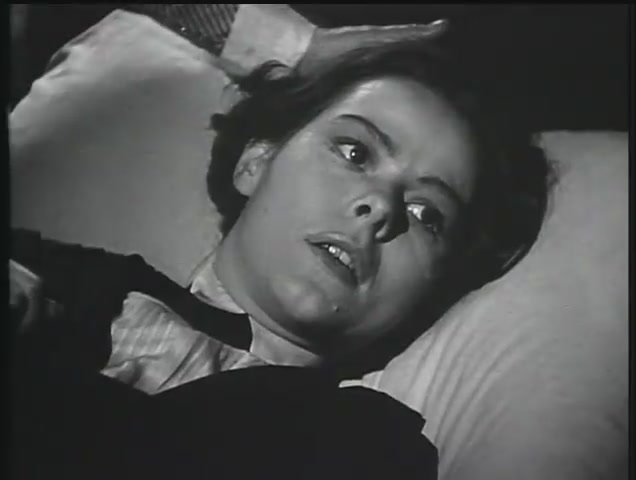
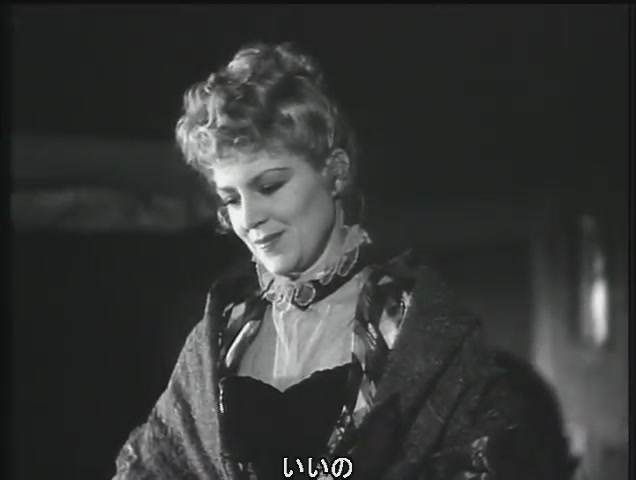
Just as Doc and Hatfield started the journey as enemies and ended as brothers, so too have Lucy and Dallas established a kind of sisterhood, a common humanity based on both of them being women in the very male dominated world of the wild west. This is a moment of true feminism in film history and, by the way, I consider myself to be a feminist film historian for many reasons, not least of which is the fact that in these Westerns it is women who are often the most interesting complex characters. Dallas is my favorite character in this film and one of my very favorite characters in any Western because she is so completely believable. In one of the best scenes of the film Lucy starts to say “Dallas, if there’s anything I can ever do…” but she stops because as much as she might want to help Dallas this is a man’s world they are both in and it is the men who have divided the women into two groups, “ladies” and prostitutes. Lucy and Dallas have discovered each others’ common humanity and in this brief exchange between them we feel their solidarity as women in a man’s world. Every woman listening to this knows exactly what I am talking about, don’t you? And then Dallas, always gentle, simply says “I know…” and I think it translates perfectly into Japanese “Wakaata” …it says so much just that one word. Then Dallas covers her friend with her own blanket and they part ways…probably never to meet again
Part 2 – At last we meet the notorious Luke Plummer, the man who, with his two brothers, murdered Ringo’s father and brother. Luke is informed that Ringo is in town and he knows that this can mean only one thing, a fight to the death. One of the men he is playing poker with comments on his winning hand by saying “dead man’s hand, Luke”.
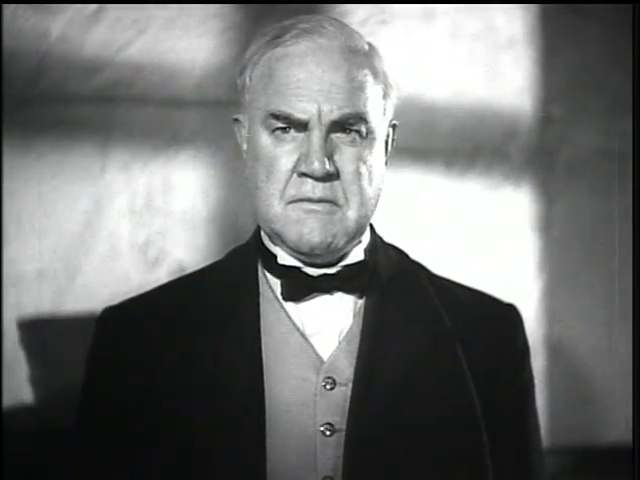
The “dead man’s hand” consists of the aces of spades and clubs along with the eights of spades and clubs; “black aces and black eights”. It is called “dead man’s hand” because the most famous gun fighter in the old west, Wild Bill Hickok, was murdered while he played poker. The hand he was holding as he was shot and killed was “black aces and black eights” and one other unknown card. Ever since Hickok’s murder the hand has been considered extremely bad luck.
Luke moves to the bar and is served by the bartender …notice that it is done exactly the right way, the bartender gives him the glass and bottle and removes the stopper, but Luke pours his own drink. As he does so, the other men standing at the bar slowly move away. This is again because of luck. If you drink with someone who has bad luck or who is cursed you might catch the bad luck or curse yourself. We might say the other men are practicing social distancing because they don’t want to catch Luke’s curse!
Part 3 – Dallas may still be a prostitute in the eyes of society, but for those who were on the stagecoach she has redeemed herself. As the wounded Mr. Peacock is taken away, he tells Dallas that she would be welcome in his home if she ever comes to his city. She will probably never go to his city, but by saying this Mr. Peacock is letting Dallas know that in his eyes she is a good and worthy person, one he would introduce to his family. We can imagine that his wife is probably just as kind and decent person as her husband and would welcome Dallas into her home.
And there is also the almost humorous final reckoning for the one character on the stagecoach who was truly irredeemable, Gatewood. Doc, Dallas, Hatfield and even Lucy have all redeemed themselves in one way or another, but Gatewood hasn’t changed at all. He has learned nothing, especially how to keep his mouth closed. He might have slipped quietly away with his stolen money, but his arrogance gets the better of him and he announces his name to the Sheriff who promptly arrests him because the telegraph has been repaired and word of his crime has reached the next town. (I wonder if this is perhaps a premonition of the fate awaiting that other blustering loudmouth, Donald J. Trump). But in the next excerpt things take a more serious turn
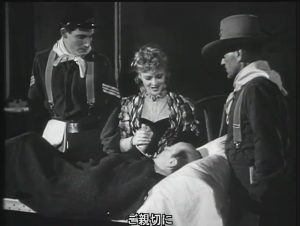
Part 4 – What remains to be worked out is the seemingly impossible love between Dallas and Ringo. Doc, Curly and Buck all look miserable as the two young lovers walk away because they all know that Ringo is about to find out that Dallas is a prostitute. They also know that regardless, Ringo is also almost certainly going to be killed in a gunfight with the Plummer brothers. Ringo and Dallas walk through the noisy streets of Lordsburg where we hear tinny piano music and drunken laughter and we see the prostitutes and their customers lingering in the doorways. Dallas wants to say goodbye and she admits, seemingly to herself, that she has just been having a crazy dream. But for Ringo it seems he has not quite woken up just yet. Go to excerpt number 5.
Part 5 – Ringo continues to accompany Dallas while on her face Ford shows us the increasing despair she feels with every step as Ringo gradually realizes what she is. They come to a flight of stairs leading down. Again, always gentle, but finally giving up all her hopes and dreams Dallas says “Well, Kid, I told you not to follow me” as if she were talking to a lost puppy she cannot take home. She goes down the stairs. Ford is using symbolism here. Dallas going “down” represents her “fall”. In Christianity the devils in Hell are actually angels who “fell” from heaven because they disobeyed God. It was very common for a prostitute to be called a “a fallen woman” because the common belief was that prostitutes were “sinful and wicked” women. But as Dallas goes down the steps like a descent into hell, Ringo follows her. He makes no long speeches because he is a westerner and a cowboy and he doesn’t have much to say, but what he says is deeply moving: “I asked you to marry me” and she replies through her tears “that’s something”. It is now clear that he does not care that she has been a prostitute because he knows that whatever else she is, she is a good, kind and gentle person and he loves her! And now WE WANT HIM TO KISS HER!…..but instead, he just says “wait here”. What the hell is this boy doing? I am going to call this “one of the two greatest kisses that never happened in a Western”.
However, I don’t think Ford made a mistake by not having them kiss. A kiss would have been a “cliché” (a cliché is something that lacks originality or which has become so familiar it is boring…one could perhaps say that the kiss would have been tatemae). A kiss would also have been out of character for Ringo. After all, the main thing he has on his mind is fighting the Plummers. He knows what his priorities are. He must have his vengeance before he can kiss the girl. Dallas will wait, but she quite sensibly believes he is going to die. Everyone believes he is going to die.
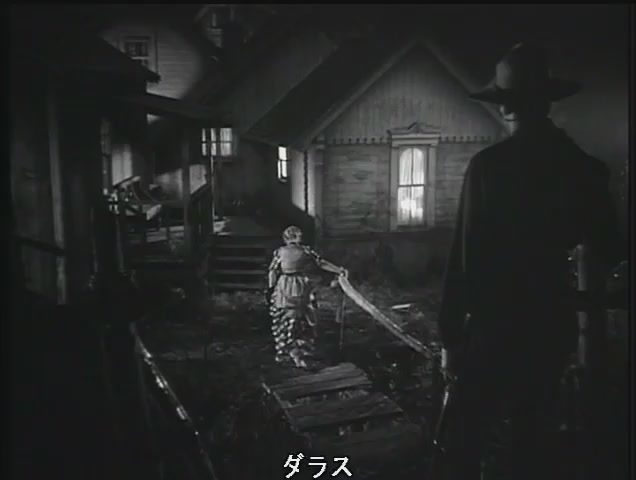
Part 6 – The final gunfight is unusual because it takes place at night. Gunfights in Western films usually happened in the daytime and usually at “high noon”, 12:00 p.m. when the sun is at its highest point in the sky. This actually makes a great deal of sense because it means that neither person could have the sun behind them (and so in the eyes of his opponent). But Ford set this gunfight late at night perhaps because neither Ringo nor the Plummers have the patience to wait for daytime. These men are intent on killing. Interestingly, in his second to last Western, Ford will once again have the final and crucial gunfight happen at night.
Luke and Ringo are both armed with rifles…specifically, Winchester repeating rifles. This is a very unusual choice of weapon for a gunfight because the whole point of a rifle was that it had more range and power than a six shooter. It was obviously exactly the weapon Ringo needed to fight the Apache from the top of the stagecoach, but in a gun fight such as he is about to have with the Plummers neither range nor power matter very much…speed matters and for rapid firing the six shooter was a much superior weapon to the Winchester, which had to be levered each time it shot. In the videos you can compare the actions required to fire a Winchester as opposed to those required to fire a revolver of the same era
Part 7 – One of Luke’s brothers is quite drunk as they walk through the darkened town when suddenly a black cat runs across their path (another instance of bad luck) and the other brother, Hank, tries to shoot him but misses. The drunken brother laughs at this, but it is clear these men are cursed.
The conflicts among the characters on the stagecoach journey were often quite complex, but the final confrontation between Ringo and the Plummers is as simple as…well… White Hat vs Black Hat! Look at images 2 and 3
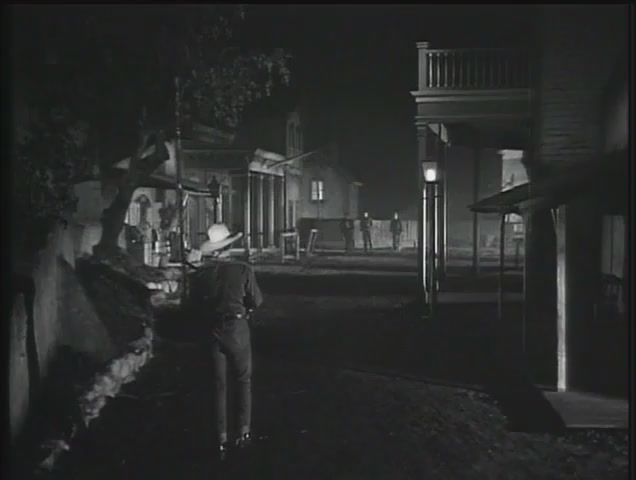
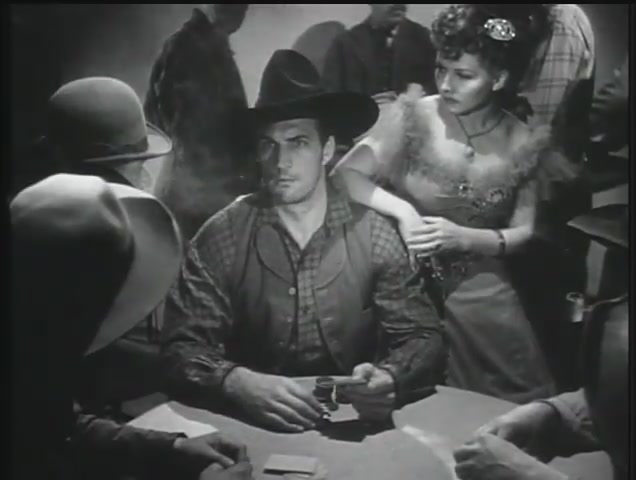
Part 8 – In Cimarron the good guy showed he was a faster and better gunman than the bad guy, but in Stagecoach even Ringo’s friends admit that Luke is probably a better gunman than Ringo. So how can Ringo possibly win this fight when Luke all alone is better than he is and both his brothers are there to back him up? Ringo resorts to a trick to win his fight. Rather than stand there and exchange fire with the Plummers, the sneaky little bastard shoots while diving to the ground and gets off his next two shots almost immediately. To us it looks like a practical solution to the problem, and it was…but it was also shockingly unusual in a Western.
In Westerns, like Jidai Geki, the final confrontation between good and evil is often a test of pure skill. Think of Musashi confronting Kojiro. True, Musashi shows up late and carrying a wooden sword (psychological trickery?) and true he does tell Kojiro he has “already lost” because he threw away his scabbard, but in the end Musashi wins because he is the more skilled swordsman.

In Western films gunfights usually went the same way. There would be a lot of dramatic build up, but in the end, it is a test of pure skill; who is faster and who shoots more accurately. But that is not how it goes in Stagecoach. Ringo diving to the ground looks…well, cowardly. But what else is he supposed to do, stand there and try to outshoot three men at once? Instead, he surprises them with his dive and gets one shot off as he does so (probably the one that hit Luke since Ringo would have wanted to take out the most dangerous brother first). Then he fired the next two while on the ground killing both of the other brothers. It still required a lot of skill killing all three with one shot each, but it would have been impossible if he had just bravely stood there exchanging fire with them in the “honorable” way.
It was a desperation move that paid off. It was also a lot closer to what a real gunfight in the old west was really like than Hollywood usually showed. Real gunfights were almost never honorable or fair. Real gunfights in the old West involved a lot of ambushing, (including shooting in the back, which was how Wild Bill Hickok was killed) and shooting unarmed men. It was Hollywood that elevated the gunfight to an “honorable” contest. In reality, it was just guys trying to kill each other any way they could (including using knives after they ran out of ammunition and even biting the enemy).
Ford also decided not to show the actual fight, but only Ringo firing his rifle as he dove to the ground. We don’t see the Plummers being hit or returning fire. We don’t actually know Ringo won until we see Luke walk back into the saloon and promptly drop dead. Then Ringo returns to Dallas where they embrace (but still no damn kiss!)
All of this would have nevertheless ended in tragedy if Curly were just going to send Ringo back to prison. But in a charming twist Curly suggests Dallas ride for a while with Ringo on the way to the prison. But he and Doc seem to have already decided to let the lovers escape and they laughingly frighten the horses into bolting. Doc wisely and ironically says, “Well, they’re safe from the blessings of civilization”. And so, they are as they ride out into the wide-open West which promises them freedom and a new beginning.
As many times as I teach this film (over two hundred times as of this writing) I am still amazed by how almost perfect it is.